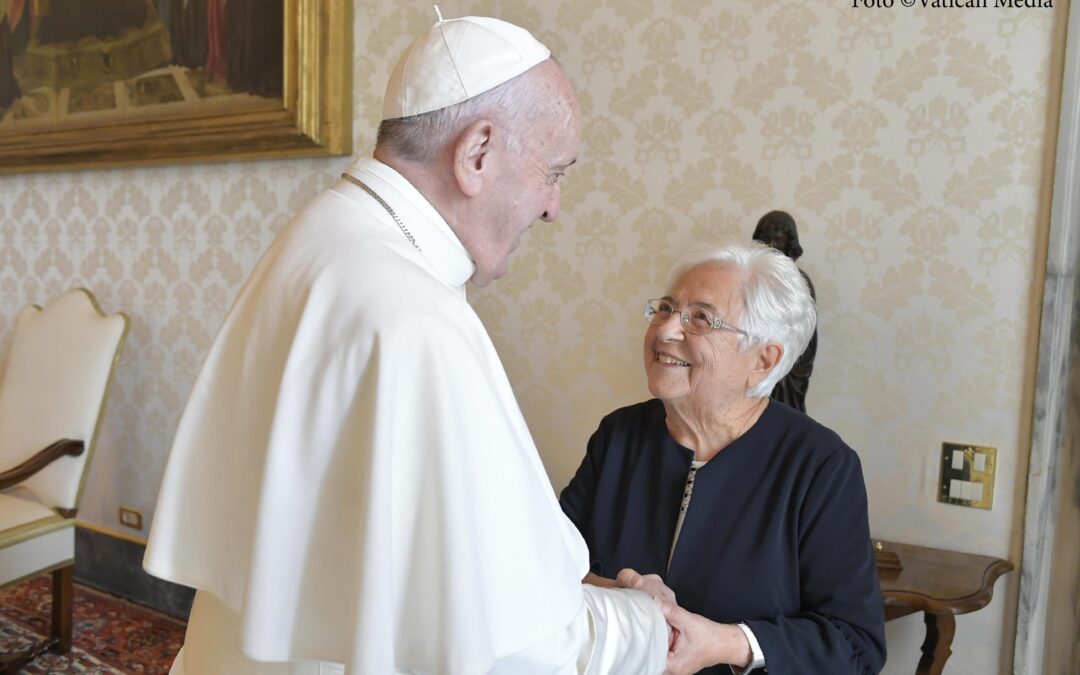
2 Sep 2019 | Non categorizzato
Trust, openness, gratitude are the words with which the President of the Focolare Movement Maria Voce and the Co-President Jesús Morán summarize the meeting with Pope Francis during the private audience of September 2, 2019. “Bring ahead the prophecies of Chiara” was the encouragement of the Pope. https://vimeo.com/357332500 Maria Voce: We have just come from the audience with the Pope. It was a beautiful meeting – a meeting of extraordinary cordiality. We had brought him a book of Chiara’s link-ups as a gift; he really appreciated it and looked at with care. We also gave him an icon of Mary called “Joy of all the Afflicted”. He loved both the title and the icon itself because he said that it was new to him and that seeing the images of people who were suffering and were going towards Mary reminded him of the last pages of Manzoni’s book where all the lepers in the hospital pray to Mary and invoke her in their affliction. The whole meeting was marked by great trust, by great openness. He kept saying, “Go ahead, go ahead” – he will have repeated it a thousand times. He thanked us for the good we do and we felt that he was really happy to see us. He also said, “Pray for me,” and so we assured him that we were praying. At a certain point I said to him: “Everyone is praying today because the whole Movement knows that we are here with you and everyone is praying for this meeting – not only the Catholics but everyone.” He extended his arms as if to include everyone who prayed. It was very beautiful. Jesús Morán: Very beautiful. I think it was a meeting marked by mutual love because he kept saying to us, ” Thank you for what you are doing – go ahead,” and we kept saying, “We support what you do; we defend your ideas.” I immediately thought of Chiara’s experience when she went to Paul VI who told her, “Everything is possible here.” Everything really is possible there. We will have to see concretely but he told us, “Go ahead, carry ahead all that Chiara foresaw,” because then we talked about many things, even practical ones. 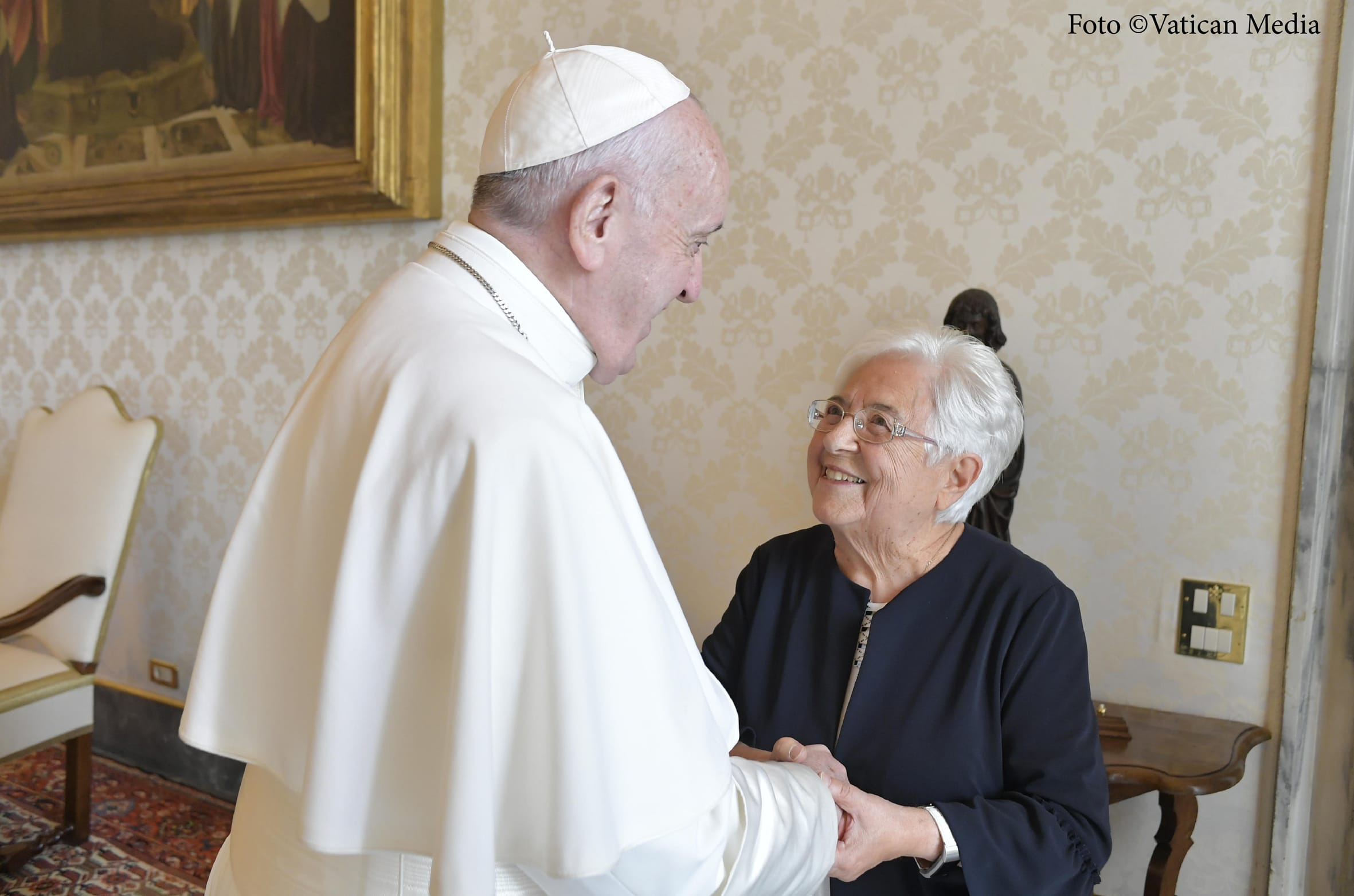 Maria Voce: He continued to say how upset he is at seeing there is nationalism, obstacles to peace and conflict even among our own people. He said: “Even in the bosom of the Church (there are) some who think differently. Why do we not learn from history?” “I have cried,” he said, “I cry when I hear certain statements against peace and against mutual understanding.” Then he told us something that seemed very beautiful. He said that sometimes it’s better to ask for forgiveness than to ask for permission – that often it is better to make mistakes and then ask for forgiveness Jesús Morán: He was very sad because certain conflicts continue to cause death. He said, “Is it possible that we have learnt nothing from the bloody wars we have experienced?” He seemed worried when we talked about Europe. We told him about the European Mariapolis. First of all, we talked about Chiara’s Centenary and he appreciated what we said. He understood that this will not be a commemoration of the past but because we feel that Chiara’s charism is truly relevant today. Maria Voce: One thing we felt is that he cares deeply about priests, members of religious communities and bishops. He cares in the very sense of saying, “Help us in this”.
Maria Voce: He continued to say how upset he is at seeing there is nationalism, obstacles to peace and conflict even among our own people. He said: “Even in the bosom of the Church (there are) some who think differently. Why do we not learn from history?” “I have cried,” he said, “I cry when I hear certain statements against peace and against mutual understanding.” Then he told us something that seemed very beautiful. He said that sometimes it’s better to ask for forgiveness than to ask for permission – that often it is better to make mistakes and then ask for forgiveness Jesús Morán: He was very sad because certain conflicts continue to cause death. He said, “Is it possible that we have learnt nothing from the bloody wars we have experienced?” He seemed worried when we talked about Europe. We told him about the European Mariapolis. First of all, we talked about Chiara’s Centenary and he appreciated what we said. He understood that this will not be a commemoration of the past but because we feel that Chiara’s charism is truly relevant today. Maria Voce: One thing we felt is that he cares deeply about priests, members of religious communities and bishops. He cares in the very sense of saying, “Help us in this”.
29 Aug 2019 | Non categorizzato
On Monday, September 2, at 10:45 a.m., the President and Co-President of the Focolare Movement, Maria Voce and Jesús Morán, will be welcomed by Pope Francis in a private audience. An important year for the Focolare is approaching: from December 7, 2019 to December 7, 2020, the Movement will remember the centenary of the birth of Chiara Lubich. With exhibits, publications and events, the centennial would like to offer to many the opportunity to learn more about the Focolare foundress and her “Charism of Unity”. The official motto of the centenary, “celebrate to meet”, shows that this is not a nostalgic memory, but that Chiara Lubich’s original message is more relevant and engaging than ever. In the recent “European Mariapolis” in the Dolomites, the participants, coming from all over the continent, expressed a strong invitation to all the European peoples to make a pact of fraternity among them. It was an example of the relevance of Chiara’s message also in the current political situation. The centenary year will also be of great importance for the internal life of the Movement: in September 2020 the General Assembly of the Focolare Movement will take place which – in addition to electing the President and Co-President – will give the orientation for the next six years to the Movement. All these are reason enough to inform Pope Francis about the current life of the Movement, about the projects underway, about the challenges to be faced. Maria Voce’s request addressed to the Vatican on 18 June 2019 to meet the Pope in a private audience was answered quite promptly. Thus the Pontiff will welcome the President and Co-President next Monday, September 2, at 10:45 a.m. Maria Voce has invited us to pray for this meeting “so that it may give joy to the Pope and be a grace for the whole Focolare Movement”.
Joachim Schwind
23 Aug 2019 | Non categorizzato
Antonio De Sanctis left us on June 21. He personified someone who, within the Focolare Movement, is known as a “volunteer of God” – someone who is committed to social and communitarian action. Tonino, as everyone called him, left us on June 21 this year. He lived in Frascati, a beautiful town in theCastelli Romani area just outside Rome, Italy. He personified someone who, within the Focolare Movement, is known as a “volunteer of God” – someone who is committed to social and communitarian action and promotes activities that benefit others. He worked sometimes alone and sometimes as part of a team in numerous projects many of which he initiated. He was a faithful and caring husband to his wife, Mary; an attentive father; a tireless worker and a committed member of the communitywhere he lived and was capable of creating truly fraternal relationships. Tonino regarded the community as a place where the presence of God and the Church could be made visible:he was not worried about what other people thought and often broke through social convention. His life is best described by the words from scripture that refer to the corporal works of mercy: these words are precepts for all Christians. “Because I was hungry and you gave me food; I was thirsty and you gave me drink; I was a stranger and you welcomed me; naked and you clothed me; sick and you visited me, imprisoned and you came to visit me…”This last phrase is particularly characteristic of Tonino because throughout his life he was dedicated to supporting prisoners and their families. This began thanks to a chance comment made by a friend. Tonino used to visit a lot of young people in prison. One day, he realised that a nun who was also a volunteer visitor was upset because of the “mountains of pornographic literature” that used to arrive. He was thinking about this on his way home when, in the main square of his town, he met a priest friend from a nearby village. He shared his concerns straightaway. The priest replied, “Next Sunday, come and tell my parishioners what you have just told me so you can collect donations to send “New City” magazines to prisoners.” This was how it began. For many years, on Sundays, at the various Masses in theCastelli Romani and southern Rome areas, Tonino’s unmistakable voice could be heard. In a shy, modest way, he used to talk about his commitment to prisoners and ask for donations to subscribe them to the Focolare magazine. He sent dozens of copies to the various prisons he visited. In February 2012, “Città Nuova”, published “The Rainbow Behind Bars” recounting, in four instalments,Tonino and his family’s many experiences. These stories are like the “little flowers” of Gospel life to which Saint Francis” often referred. Sometimes Tonino’s behaviour could seem daring – he did not mind running risks. For example, he did not hesitate to welcome prisoners into his home. He became a second father to many of them even after they were released. The excerpt from a letter written by one of the former prisoners expresses this very clearly: “In your house, I finally felt ‘at home’. I have never had this sense of belonging to a place and to people before. You were the means through which I felt Jesus’ mercytouch my heart and I understood the place God occupies in my life. He is my first thought in the morning and my last thought before I go to sleep. I am happy because God has entered my life like a great hurricane sweeping away everything else. Antonio, you and your whole family are a living witness to the Gospel, you are a work of God.” Many people attended his funeral on 22 June in the cathedral of Frascati. The Mass was concelebrated by his brother-in-law, Don Enrico Pepe, and Cardinal Joao Braz de Aviz. In their eulogy his three children, Miriam, Gabriele and Stefano, said: “You were a safe harbour at the end of a sunny day or after a storm: you were always there, ready to listen, to welcome us and to encourage us to return to the sea without fear.”
Lina Ciampi
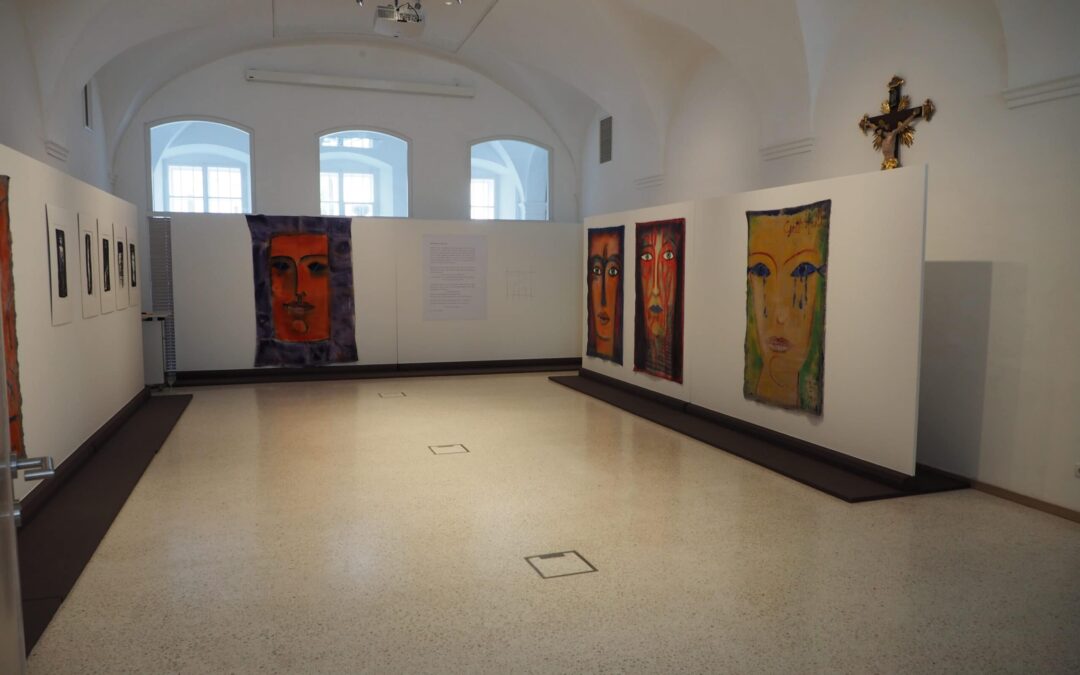
22 Aug 2019 | Non categorizzato
Since 2012, theworld-famous Salzburg Festival, the most important event dedicated to classical music, starts with an overture spirituelle:anumberof sacred music concerts and performances dedicated to dialoguebetween religions. Many famous international artists take part in this festival, andthis year, for the first time, the Archdiocese of Salzburg participated with an exhibition of works by the French artist Michel Pochet. 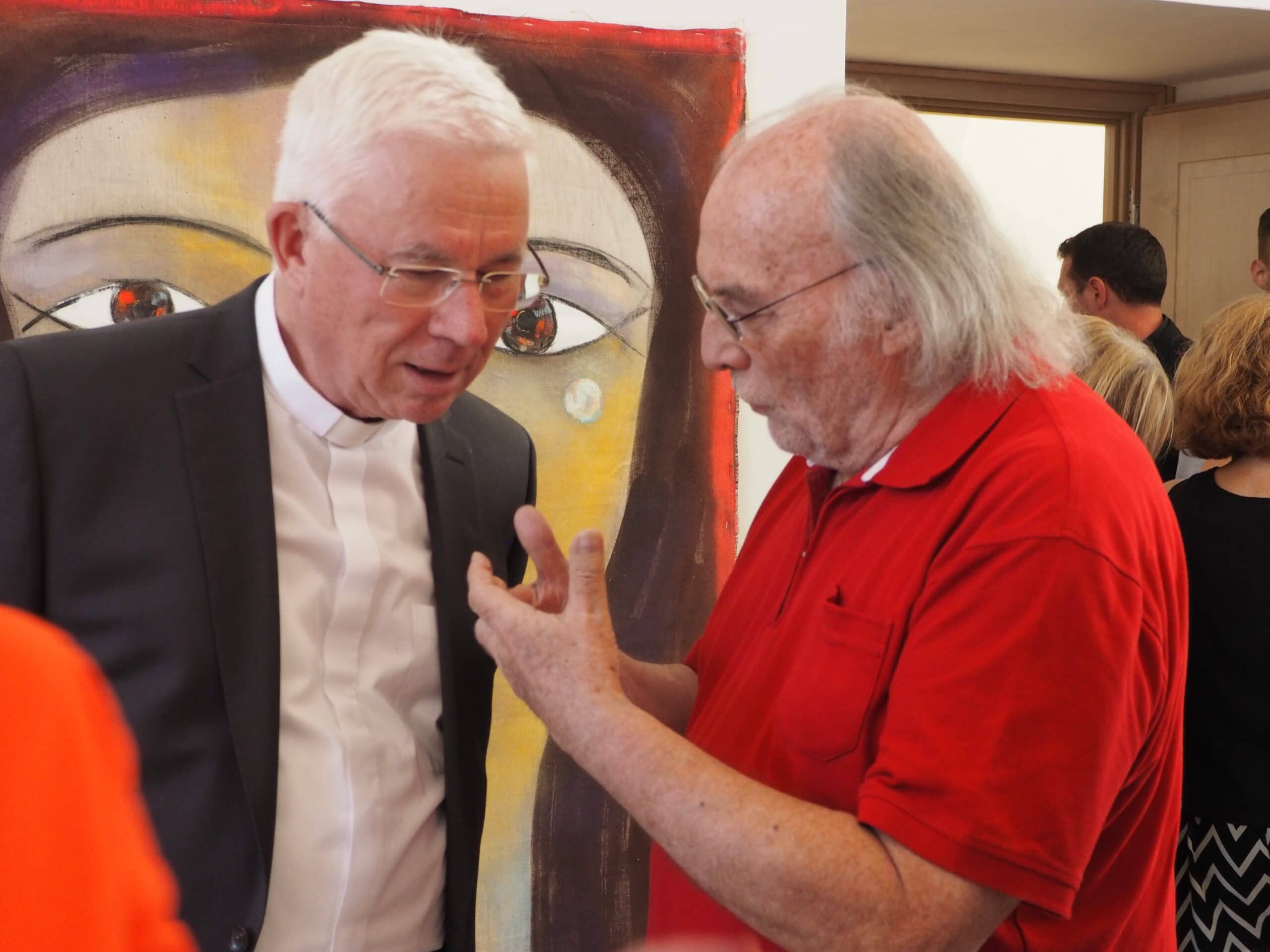 On July 20, 2019 the entrance hall of the Archbishop’s Palace in the city of Salzburg was packed with people.At five o’clock on that Saturday afternoon, Helga Rabl-Stadler, the president of the Festival and Archbishop Franz Lackner inaugurated the exhibition entitled “Lacrimae”(tears), worksof the French artist Michel Pochet. Mgr. Matthäus Appesbacher, the Bishop’s vicar said: “It is the first time that the Salzburg Catholic Church is participating in the so-called ouverture spirituelle of the music festival”. He recountedall about the genesis of this exhibition, andsharedthat when he came to know that Pochet presented his work of art, the weeping face of God-Mercy, as a gift to Pope Francis, he decided to invite the artist to this year’s ouverture spirituelle, the central theme of which was “tears”. In his brief speech Michel Pochet insisted that “beauty is a primary need for man”. He emphasized that artists need to be freed from social uselessness complex, and he related the story of a young man in the Amazon region who managed to support hishungry family by playing his flute. The works chosen for this exhibition, which lasted till July 30, stimulated dialogue. The majestic setting for it was the city of Salsburg, where the legacy of this past Church state stands outeverywhere. Here, the encounter between Church and art speaks with a strong celebratory tone, while Pochet’s works are decidedly anti-triumphalistic in matter, form and content.
On July 20, 2019 the entrance hall of the Archbishop’s Palace in the city of Salzburg was packed with people.At five o’clock on that Saturday afternoon, Helga Rabl-Stadler, the president of the Festival and Archbishop Franz Lackner inaugurated the exhibition entitled “Lacrimae”(tears), worksof the French artist Michel Pochet. Mgr. Matthäus Appesbacher, the Bishop’s vicar said: “It is the first time that the Salzburg Catholic Church is participating in the so-called ouverture spirituelle of the music festival”. He recountedall about the genesis of this exhibition, andsharedthat when he came to know that Pochet presented his work of art, the weeping face of God-Mercy, as a gift to Pope Francis, he decided to invite the artist to this year’s ouverture spirituelle, the central theme of which was “tears”. In his brief speech Michel Pochet insisted that “beauty is a primary need for man”. He emphasized that artists need to be freed from social uselessness complex, and he related the story of a young man in the Amazon region who managed to support hishungry family by playing his flute. The works chosen for this exhibition, which lasted till July 30, stimulated dialogue. The majestic setting for it was the city of Salsburg, where the legacy of this past Church state stands outeverywhere. Here, the encounter between Church and art speaks with a strong celebratory tone, while Pochet’s works are decidedly anti-triumphalistic in matter, form and content. 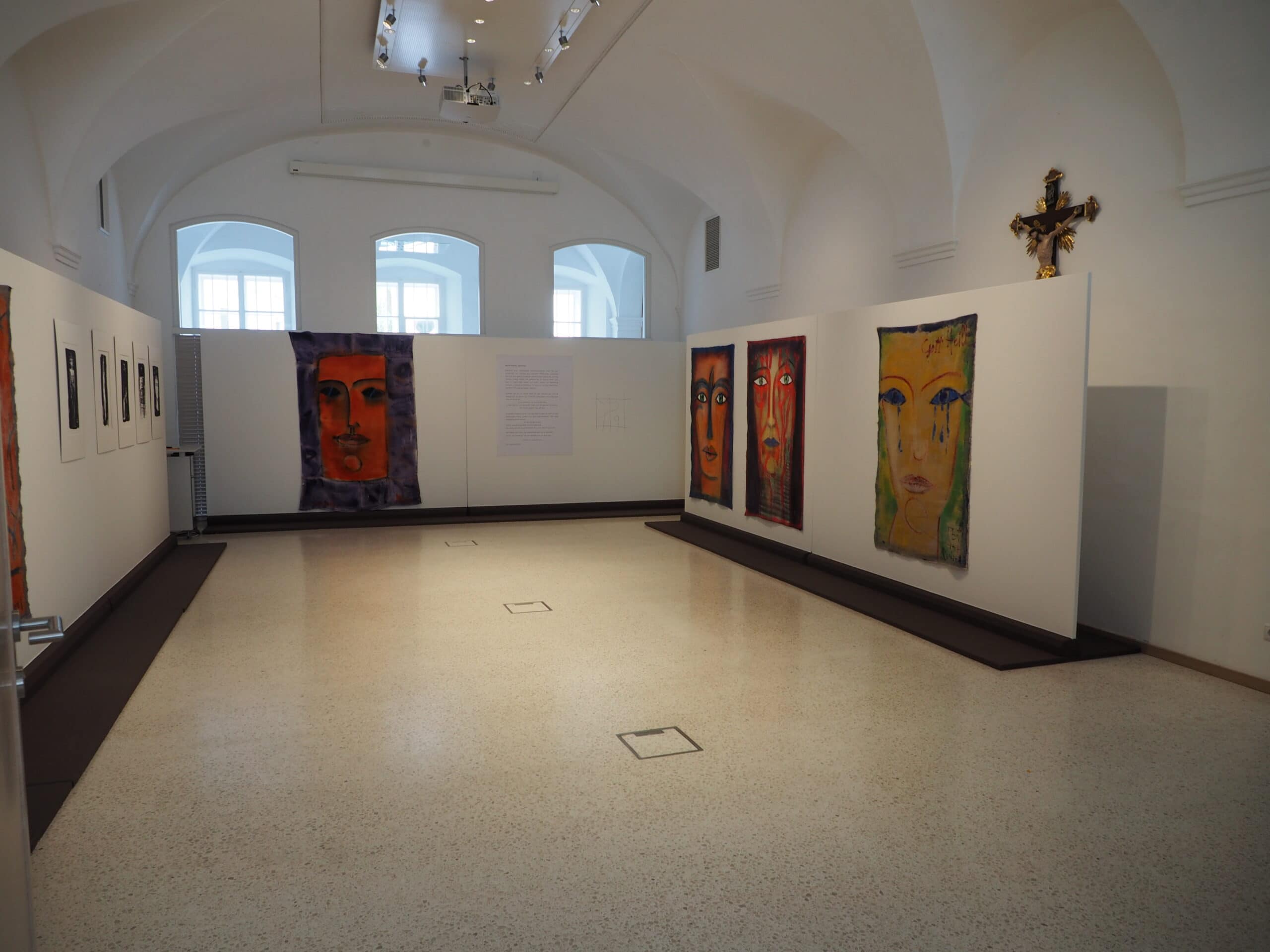 His canvases, as the one which “speaks” about God’s presence in Auschwitz, demonstrate this. Pochet uses alightstroke on a white cloth almost reduced to shreds. This piece of art depicts God’s crying face-heart looking at the outrageous horror of a mountain of corpses. One detail surprises and almost irritates: each corpse has an identification card, something thatdid not exist in extermination camps. However, we see itin TV detective films: it is only a bureaucratic procedure that draws dead people in morgues out of anonymity. On canvas it is a timid reminder of God’s memory: He does not forget, although an attempt has been made to erase countless names from the face of the earth. Next to this scene, almost as a contrast, there appears a large face of Mary whose linear features, present an almost virile aspect. This cloth soaked in tender colours is full of poetry: Mary’s tears are like pearls of dew and speak of the dawn of a new creation. This exhibition was set up in the entrance hall and an adjacent room. It included a series of graphics in black and white: a “Via Crucis” with scenes from Christ’s passion and others that show today’s sufferings. It also included a series of meditations on other “faces of God”, that show closeness tohis people through his archangels. One can define this as “sacred art”, although it differs a lotfrom works known by this name. It does not depict scenes from the Holy Scripture or – as in the Baroque and Rococo art- the concepts of theologians, but it depicts the audacity of personal reflection. The focus on the face brings to mind the words of the philosopher Giuseppe M. Zanghì, according to whom “the emerging Sacred” in the twenty-first century is “One without a face”, a “Power without a face”.[1]
His canvases, as the one which “speaks” about God’s presence in Auschwitz, demonstrate this. Pochet uses alightstroke on a white cloth almost reduced to shreds. This piece of art depicts God’s crying face-heart looking at the outrageous horror of a mountain of corpses. One detail surprises and almost irritates: each corpse has an identification card, something thatdid not exist in extermination camps. However, we see itin TV detective films: it is only a bureaucratic procedure that draws dead people in morgues out of anonymity. On canvas it is a timid reminder of God’s memory: He does not forget, although an attempt has been made to erase countless names from the face of the earth. Next to this scene, almost as a contrast, there appears a large face of Mary whose linear features, present an almost virile aspect. This cloth soaked in tender colours is full of poetry: Mary’s tears are like pearls of dew and speak of the dawn of a new creation. This exhibition was set up in the entrance hall and an adjacent room. It included a series of graphics in black and white: a “Via Crucis” with scenes from Christ’s passion and others that show today’s sufferings. It also included a series of meditations on other “faces of God”, that show closeness tohis people through his archangels. One can define this as “sacred art”, although it differs a lotfrom works known by this name. It does not depict scenes from the Holy Scripture or – as in the Baroque and Rococo art- the concepts of theologians, but it depicts the audacity of personal reflection. The focus on the face brings to mind the words of the philosopher Giuseppe M. Zanghì, according to whom “the emerging Sacred” in the twenty-first century is “One without a face”, a “Power without a face”.[1]
Peter Seifert , art historian
[1]Giuseppe Maria Zanghí, Notte della cultura europea, Rome 2007, pp. 46-47
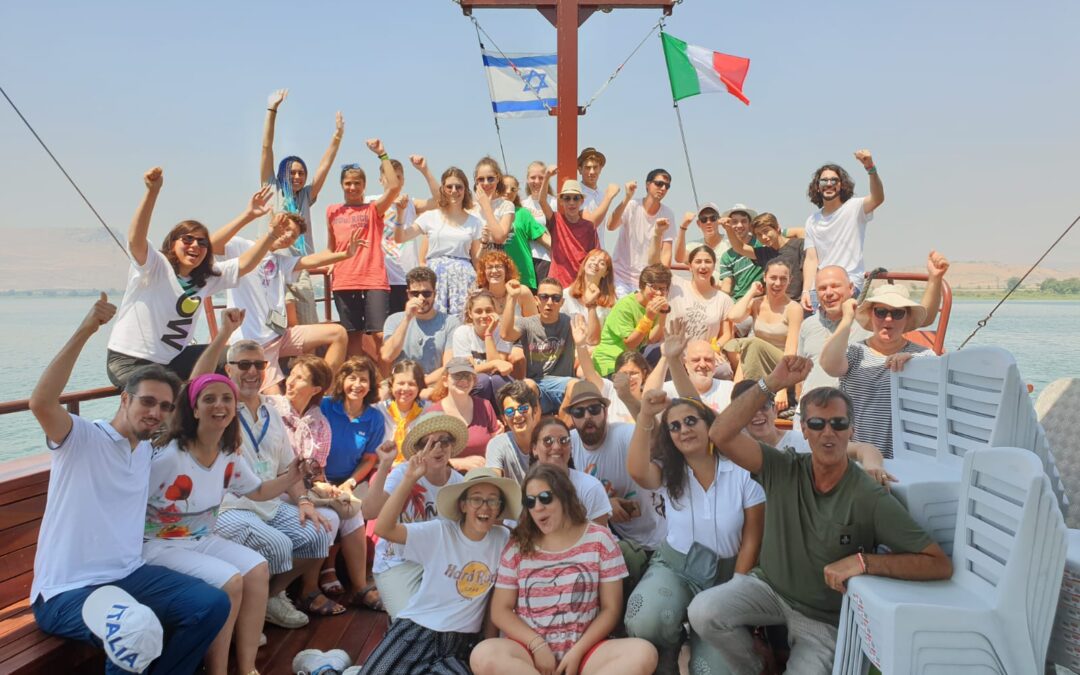
18 Aug 2019 | Non categorizzato
The Emilia Romagna Teens4Unity, who chose the Holy Land as their site for this year’s “workshop”, shared a very profound spiritual and human experience with peers who live in that country. Their enriching experience ranged from visiting the Grotto of the Nativity to trekking in the Judaean Desert, from visting the Holy Sepulchre to bathing in the Dead Sea, from the renewal of their baptismal promises in the River Jordan to a boat trip on Lake Tiberias. If one stops at this itinerary, it would have been only a trip or, as many would call it, a pilgrimage to the Holy Land in the footsteps of Jesus to retrace the life of Him who gives meaning to our life as Christians. 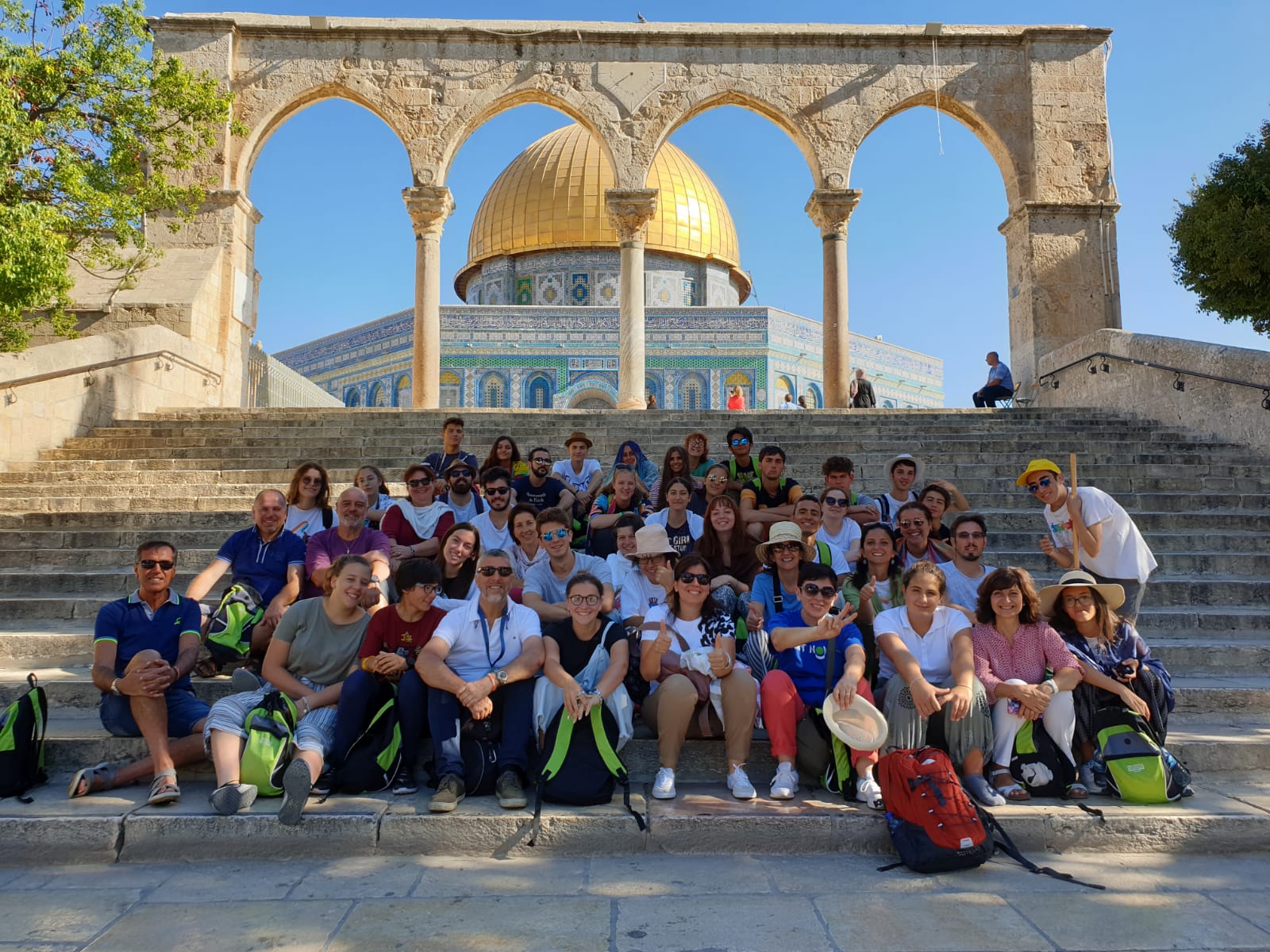 But if to this itinerary, one adds an afternoon visit to the Creche Orphanage in Bethlehem, a meeting with the Auxiliary Bishop Kamal Batish of the Patriarchate of Jerusalem and the exchange of experiences with youth and other local Focolare members, then one would be able to talk about the Emilia Romagna Teens4Unity Workshop that took place in the Holy Land from 23 to 30 July. The protagonists were 45 young people and animators, keen to become more familiar with places that are at the centre of their Christian faith. These young people have already participated in many other experiences: they took part in World Youth Day held in Poland three years ago; they visited Amatrice in the Abruzzo region, where they offered a donation of money to support the youth of this Italian city devastated by a powerful earthquake in 2016; they took part in two workshops organized by the international music groups Gen Verde and Gen Rosso; they organized ecological and non-ecological activities, promoted initiatives in favour of the Zero Hunger project and collected money to provide for hearing-aid batteries needed for deaf and dumb children in Belarus. These activities led to the desire for a deeper spiritual experience, and these young people went for it. James related: “I had a very strong experience while we were walking in the desert. The animators suggested silence to help us live a moment of personal dialogue with Jesus. I must admit that after a while that silence frightened me because in our society we are not used to it”. Life in common and sharing are typical characteristics of these experiences, where one feels comfortable to share everything, from tiredness to deep spiritual thoughts, and where the group becomes very sensitive to the difficulties of the individual. Chiara commented: “In a few days, I will forget all about the hot weather, the effort to climb Mount Tabor on foot, running a temperature on the day we had to visit the orphanage, something I was really looking foward to… but I will always remember this trip because I have lived it with my family par excellence. Yes, I travel even with my natural family, but it’s not the same. My Focolare friends are real family to me and a very special one”.
But if to this itinerary, one adds an afternoon visit to the Creche Orphanage in Bethlehem, a meeting with the Auxiliary Bishop Kamal Batish of the Patriarchate of Jerusalem and the exchange of experiences with youth and other local Focolare members, then one would be able to talk about the Emilia Romagna Teens4Unity Workshop that took place in the Holy Land from 23 to 30 July. The protagonists were 45 young people and animators, keen to become more familiar with places that are at the centre of their Christian faith. These young people have already participated in many other experiences: they took part in World Youth Day held in Poland three years ago; they visited Amatrice in the Abruzzo region, where they offered a donation of money to support the youth of this Italian city devastated by a powerful earthquake in 2016; they took part in two workshops organized by the international music groups Gen Verde and Gen Rosso; they organized ecological and non-ecological activities, promoted initiatives in favour of the Zero Hunger project and collected money to provide for hearing-aid batteries needed for deaf and dumb children in Belarus. These activities led to the desire for a deeper spiritual experience, and these young people went for it. James related: “I had a very strong experience while we were walking in the desert. The animators suggested silence to help us live a moment of personal dialogue with Jesus. I must admit that after a while that silence frightened me because in our society we are not used to it”. Life in common and sharing are typical characteristics of these experiences, where one feels comfortable to share everything, from tiredness to deep spiritual thoughts, and where the group becomes very sensitive to the difficulties of the individual. Chiara commented: “In a few days, I will forget all about the hot weather, the effort to climb Mount Tabor on foot, running a temperature on the day we had to visit the orphanage, something I was really looking foward to… but I will always remember this trip because I have lived it with my family par excellence. Yes, I travel even with my natural family, but it’s not the same. My Focolare friends are real family to me and a very special one”. 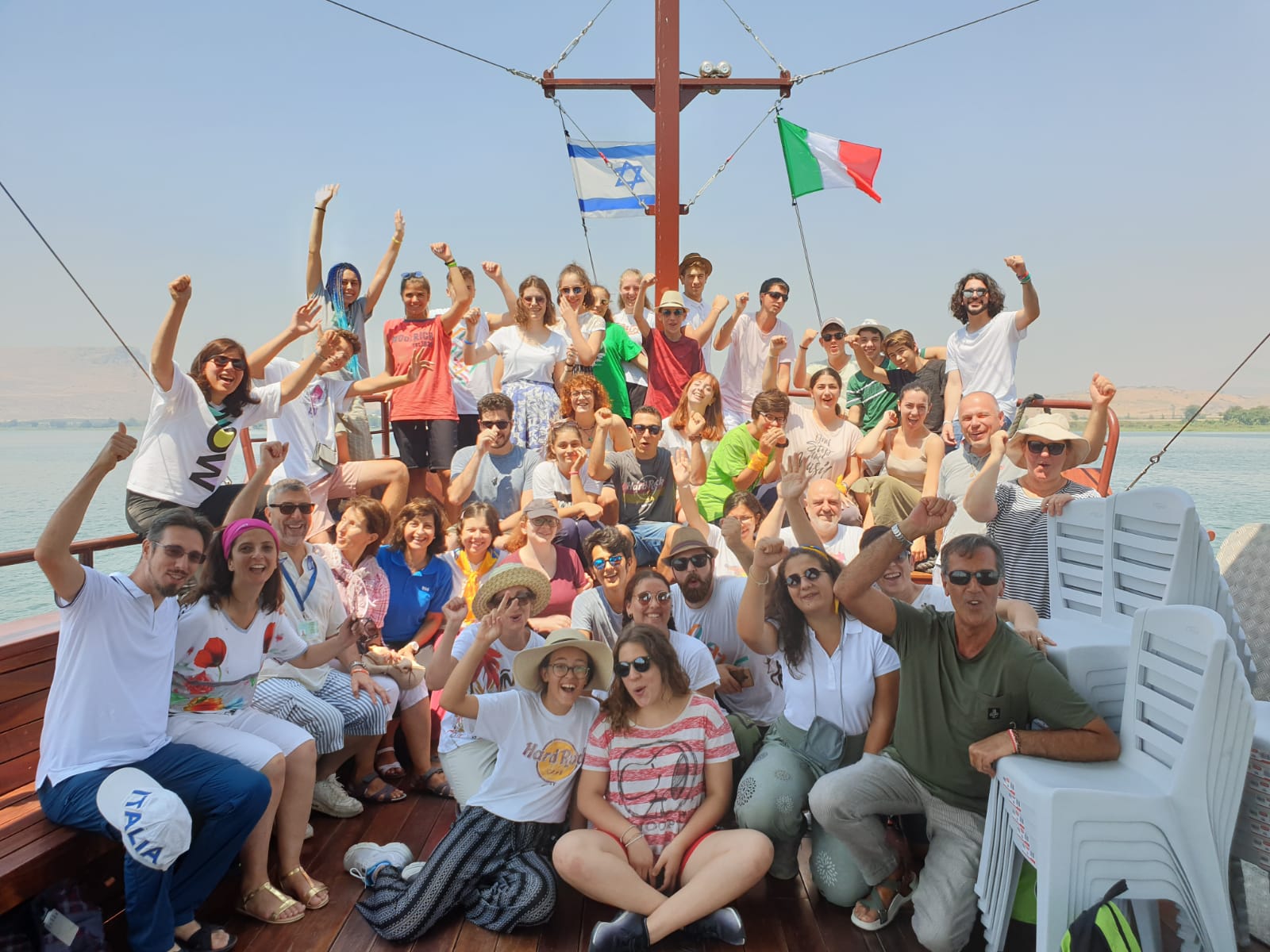 As expected, moments of tension and fatigue were also part of the journey, yet as Joshua said: “When we listened to the experiences of the Palestinian youth, our perspective changed. We have no idea what it means to be a minority because of religious belief. We have never experienced the presence of a wall in our everyday life like the one that separates Israel and Palestine. These things became food for my thoughts”. Annamaria said: “When we met the children at the Creche, my eyes opened. I have discovered that all my life is a great gift”. The seven days in the Holy Land flew by and it was soon time for the group to return to Italy, but this experience, which summarises the great mystery of pain-love that finds fulfilment in the Resurrection, remains imprinted on the heart of each one. That empty sepulchre still cries out loudly Alleluia.
As expected, moments of tension and fatigue were also part of the journey, yet as Joshua said: “When we listened to the experiences of the Palestinian youth, our perspective changed. We have no idea what it means to be a minority because of religious belief. We have never experienced the presence of a wall in our everyday life like the one that separates Israel and Palestine. These things became food for my thoughts”. Annamaria said: “When we met the children at the Creche, my eyes opened. I have discovered that all my life is a great gift”. The seven days in the Holy Land flew by and it was soon time for the group to return to Italy, but this experience, which summarises the great mystery of pain-love that finds fulfilment in the Resurrection, remains imprinted on the heart of each one. That empty sepulchre still cries out loudly Alleluia.
Tiziana Nicastro

 Maria Voce: He continued to say how upset he is at seeing there is nationalism, obstacles to peace and conflict even among our own people. He said: “Even in the bosom of the Church (there are) some who think differently. Why do we not learn from history?” “I have cried,” he said, “I cry when I hear certain statements against peace and against mutual understanding.” Then he told us something that seemed very beautiful. He said that sometimes it’s better to ask for forgiveness than to ask for permission – that often it is better to make mistakes and then ask for forgiveness Jesús Morán: He was very sad because certain conflicts continue to cause death. He said, “Is it possible that we have learnt nothing from the bloody wars we have experienced?” He seemed worried when we talked about Europe. We told him about the European Mariapolis. First of all, we talked about Chiara’s Centenary and he appreciated what we said. He understood that this will not be a commemoration of the past but because we feel that Chiara’s charism is truly relevant today. Maria Voce: One thing we felt is that he cares deeply about priests, members of religious communities and bishops. He cares in the very sense of saying, “Help us in this”.
Maria Voce: He continued to say how upset he is at seeing there is nationalism, obstacles to peace and conflict even among our own people. He said: “Even in the bosom of the Church (there are) some who think differently. Why do we not learn from history?” “I have cried,” he said, “I cry when I hear certain statements against peace and against mutual understanding.” Then he told us something that seemed very beautiful. He said that sometimes it’s better to ask for forgiveness than to ask for permission – that often it is better to make mistakes and then ask for forgiveness Jesús Morán: He was very sad because certain conflicts continue to cause death. He said, “Is it possible that we have learnt nothing from the bloody wars we have experienced?” He seemed worried when we talked about Europe. We told him about the European Mariapolis. First of all, we talked about Chiara’s Centenary and he appreciated what we said. He understood that this will not be a commemoration of the past but because we feel that Chiara’s charism is truly relevant today. Maria Voce: One thing we felt is that he cares deeply about priests, members of religious communities and bishops. He cares in the very sense of saying, “Help us in this”.

 On July 20, 2019 the entrance hall of the Archbishop’s Palace in the city of Salzburg was packed with people.At five o’clock on that Saturday afternoon, Helga Rabl-Stadler, the president of the Festival and Archbishop Franz Lackner inaugurated the exhibition entitled “Lacrimae”(tears), worksof the French artist Michel Pochet. Mgr. Matthäus Appesbacher, the Bishop’s vicar said: “It is the first time that the Salzburg Catholic Church is participating in the so-called ouverture spirituelle of the music festival”. He recountedall about the genesis of this exhibition, andsharedthat when he came to know that Pochet presented his work of art, the weeping face of God-Mercy, as a gift to Pope Francis, he decided to invite the artist to this year’s ouverture spirituelle, the central theme of which was “tears”. In his brief speech Michel Pochet insisted that “beauty is a primary need for man”. He emphasized that artists need to be freed from social uselessness complex, and he related the story of a young man in the Amazon region who managed to support hishungry family by playing his flute. The works chosen for this exhibition, which lasted till July 30, stimulated dialogue. The majestic setting for it was the city of Salsburg, where the legacy of this past Church state stands outeverywhere. Here, the encounter between Church and art speaks with a strong celebratory tone, while Pochet’s works are decidedly anti-triumphalistic in matter, form and content.
On July 20, 2019 the entrance hall of the Archbishop’s Palace in the city of Salzburg was packed with people.At five o’clock on that Saturday afternoon, Helga Rabl-Stadler, the president of the Festival and Archbishop Franz Lackner inaugurated the exhibition entitled “Lacrimae”(tears), worksof the French artist Michel Pochet. Mgr. Matthäus Appesbacher, the Bishop’s vicar said: “It is the first time that the Salzburg Catholic Church is participating in the so-called ouverture spirituelle of the music festival”. He recountedall about the genesis of this exhibition, andsharedthat when he came to know that Pochet presented his work of art, the weeping face of God-Mercy, as a gift to Pope Francis, he decided to invite the artist to this year’s ouverture spirituelle, the central theme of which was “tears”. In his brief speech Michel Pochet insisted that “beauty is a primary need for man”. He emphasized that artists need to be freed from social uselessness complex, and he related the story of a young man in the Amazon region who managed to support hishungry family by playing his flute. The works chosen for this exhibition, which lasted till July 30, stimulated dialogue. The majestic setting for it was the city of Salsburg, where the legacy of this past Church state stands outeverywhere. Here, the encounter between Church and art speaks with a strong celebratory tone, while Pochet’s works are decidedly anti-triumphalistic in matter, form and content.  His canvases, as the one which “speaks” about God’s presence in Auschwitz, demonstrate this. Pochet uses alightstroke on a white cloth almost reduced to shreds. This piece of art depicts God’s crying face-heart looking at the outrageous horror of a mountain of corpses. One detail surprises and almost irritates: each corpse has an identification card, something thatdid not exist in extermination camps. However, we see itin TV detective films: it is only a bureaucratic procedure that draws dead people in morgues out of anonymity. On canvas it is a timid reminder of God’s memory: He does not forget, although an attempt has been made to erase countless names from the face of the earth. Next to this scene, almost as a contrast, there appears a large face of Mary whose linear features, present an almost virile aspect. This cloth soaked in tender colours is full of poetry: Mary’s tears are like pearls of dew and speak of the dawn of a new creation. This exhibition was set up in the entrance hall and an adjacent room. It included a series of graphics in black and white: a “Via Crucis” with scenes from Christ’s passion and others that show today’s sufferings. It also included a series of meditations on other “faces of God”, that show closeness tohis people through his archangels. One can define this as “sacred art”, although it differs a lotfrom works known by this name. It does not depict scenes from the Holy Scripture or – as in the Baroque and Rococo art- the concepts of theologians, but it depicts the audacity of personal reflection. The focus on the face brings to mind the words of the philosopher Giuseppe M. Zanghì, according to whom “the emerging Sacred” in the twenty-first century is “One without a face”, a “Power without a face”.[1]
His canvases, as the one which “speaks” about God’s presence in Auschwitz, demonstrate this. Pochet uses alightstroke on a white cloth almost reduced to shreds. This piece of art depicts God’s crying face-heart looking at the outrageous horror of a mountain of corpses. One detail surprises and almost irritates: each corpse has an identification card, something thatdid not exist in extermination camps. However, we see itin TV detective films: it is only a bureaucratic procedure that draws dead people in morgues out of anonymity. On canvas it is a timid reminder of God’s memory: He does not forget, although an attempt has been made to erase countless names from the face of the earth. Next to this scene, almost as a contrast, there appears a large face of Mary whose linear features, present an almost virile aspect. This cloth soaked in tender colours is full of poetry: Mary’s tears are like pearls of dew and speak of the dawn of a new creation. This exhibition was set up in the entrance hall and an adjacent room. It included a series of graphics in black and white: a “Via Crucis” with scenes from Christ’s passion and others that show today’s sufferings. It also included a series of meditations on other “faces of God”, that show closeness tohis people through his archangels. One can define this as “sacred art”, although it differs a lotfrom works known by this name. It does not depict scenes from the Holy Scripture or – as in the Baroque and Rococo art- the concepts of theologians, but it depicts the audacity of personal reflection. The focus on the face brings to mind the words of the philosopher Giuseppe M. Zanghì, according to whom “the emerging Sacred” in the twenty-first century is “One without a face”, a “Power without a face”.[1] 
 But if to this itinerary, one adds an afternoon visit to the Creche Orphanage in Bethlehem, a meeting with the Auxiliary Bishop Kamal Batish of the Patriarchate of Jerusalem and the exchange of experiences with youth and other local Focolare members, then one would be able to talk about the Emilia Romagna Teens4Unity Workshop that took place in the Holy Land from 23 to 30 July. The protagonists were 45 young people and animators, keen to become more familiar with places that are at the centre of their Christian faith. These young people have already participated in many other experiences: they took part in World Youth Day held in Poland three years ago; they visited Amatrice in the Abruzzo region, where they offered a donation of money to support the youth of this Italian city devastated by a powerful earthquake in 2016; they took part in two workshops organized by the international music groups Gen Verde and Gen Rosso; they organized ecological and non-ecological activities, promoted initiatives in favour of the Zero Hunger project and collected money to provide for hearing-aid batteries needed for deaf and dumb children in Belarus. These activities led to the desire for a deeper spiritual experience, and these young people went for it. James related: “I had a very strong experience while we were walking in the desert. The animators suggested silence to help us live a moment of personal dialogue with Jesus. I must admit that after a while that silence frightened me because in our society we are not used to it”. Life in common and sharing are typical characteristics of these experiences, where one feels comfortable to share everything, from tiredness to deep spiritual thoughts, and where the group becomes very sensitive to the difficulties of the individual. Chiara commented: “In a few days, I will forget all about the hot weather, the effort to climb Mount Tabor on foot, running a temperature on the day we had to visit the orphanage, something I was really looking foward to… but I will always remember this trip because I have lived it with my family par excellence. Yes, I travel even with my natural family, but it’s not the same. My Focolare friends are real family to me and a very special one”.
But if to this itinerary, one adds an afternoon visit to the Creche Orphanage in Bethlehem, a meeting with the Auxiliary Bishop Kamal Batish of the Patriarchate of Jerusalem and the exchange of experiences with youth and other local Focolare members, then one would be able to talk about the Emilia Romagna Teens4Unity Workshop that took place in the Holy Land from 23 to 30 July. The protagonists were 45 young people and animators, keen to become more familiar with places that are at the centre of their Christian faith. These young people have already participated in many other experiences: they took part in World Youth Day held in Poland three years ago; they visited Amatrice in the Abruzzo region, where they offered a donation of money to support the youth of this Italian city devastated by a powerful earthquake in 2016; they took part in two workshops organized by the international music groups Gen Verde and Gen Rosso; they organized ecological and non-ecological activities, promoted initiatives in favour of the Zero Hunger project and collected money to provide for hearing-aid batteries needed for deaf and dumb children in Belarus. These activities led to the desire for a deeper spiritual experience, and these young people went for it. James related: “I had a very strong experience while we were walking in the desert. The animators suggested silence to help us live a moment of personal dialogue with Jesus. I must admit that after a while that silence frightened me because in our society we are not used to it”. Life in common and sharing are typical characteristics of these experiences, where one feels comfortable to share everything, from tiredness to deep spiritual thoughts, and where the group becomes very sensitive to the difficulties of the individual. Chiara commented: “In a few days, I will forget all about the hot weather, the effort to climb Mount Tabor on foot, running a temperature on the day we had to visit the orphanage, something I was really looking foward to… but I will always remember this trip because I have lived it with my family par excellence. Yes, I travel even with my natural family, but it’s not the same. My Focolare friends are real family to me and a very special one”.  As expected, moments of tension and fatigue were also part of the journey, yet as Joshua said: “When we listened to the experiences of the Palestinian youth, our perspective changed. We have no idea what it means to be a minority because of religious belief. We have never experienced the presence of a wall in our everyday life like the one that separates Israel and Palestine. These things became food for my thoughts”. Annamaria said: “When we met the children at the Creche, my eyes opened. I have discovered that all my life is a great gift”. The seven days in the Holy Land flew by and it was soon time for the group to return to Italy, but this experience, which summarises the great mystery of pain-love that finds fulfilment in the Resurrection, remains imprinted on the heart of each one. That empty sepulchre still cries out loudly Alleluia.
As expected, moments of tension and fatigue were also part of the journey, yet as Joshua said: “When we listened to the experiences of the Palestinian youth, our perspective changed. We have no idea what it means to be a minority because of religious belief. We have never experienced the presence of a wall in our everyday life like the one that separates Israel and Palestine. These things became food for my thoughts”. Annamaria said: “When we met the children at the Creche, my eyes opened. I have discovered that all my life is a great gift”. The seven days in the Holy Land flew by and it was soon time for the group to return to Italy, but this experience, which summarises the great mystery of pain-love that finds fulfilment in the Resurrection, remains imprinted on the heart of each one. That empty sepulchre still cries out loudly Alleluia.